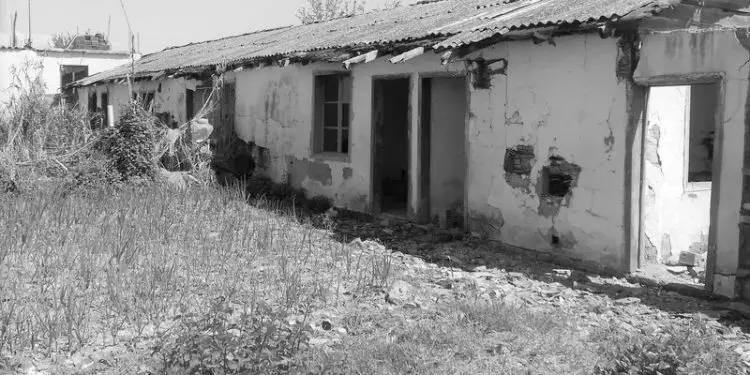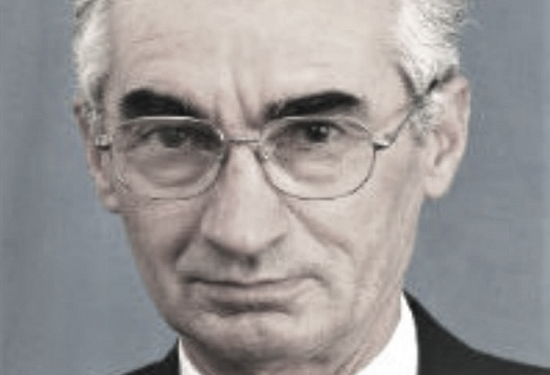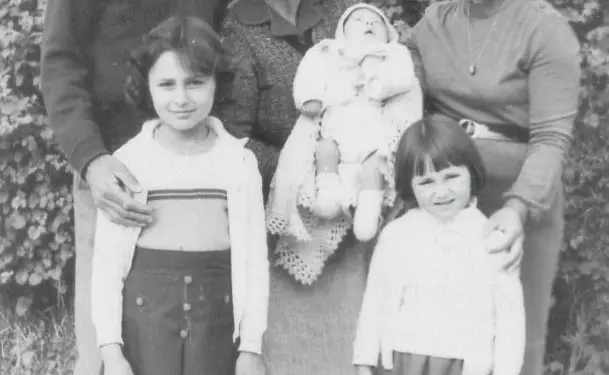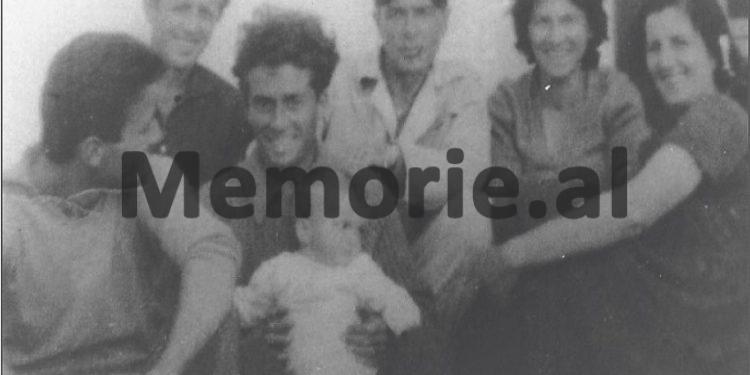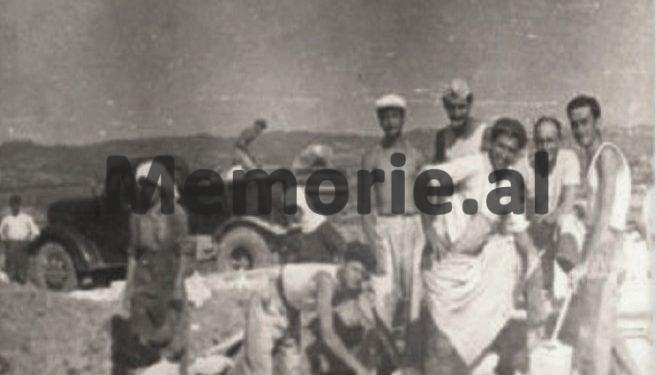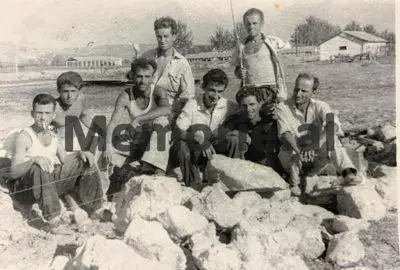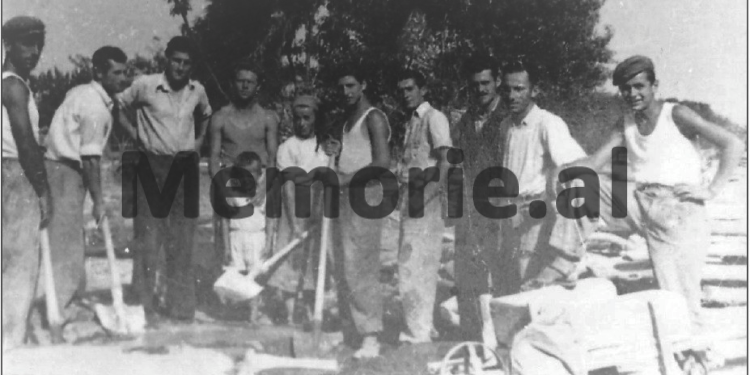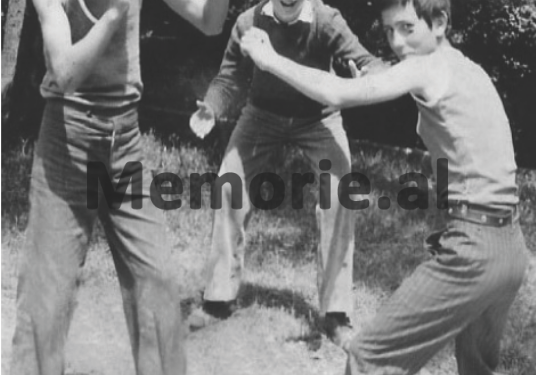By Eugene Merlika
INSTEAD OF A BUNCH OF FLOWERS
(Memory of a teacher)
“Even when our heads are covered with gray hair
We will bring to mind a respectful memory,
I love you like a child,
The simple but great name, teacher”
Lazar Siliqi
Memorie.al / I have often remembered these verses embedded early in my life, at the beginning of pre-teen age, when concepts are planted like seeds in a fertile garden, germinate and continue to grow over time. The more I leave that period, the more the years pass, the more those verses remain fresh in the memory, already tired, from the weight of the years and from the merciless bombardment of the diverse world that surrounds us.
In the whole gloomy framework of my childhood and youth, spent in the death and internment camps, in that multitude of human figures, with which, willy-nilly, the daily episodes of being were connected, various figures, most of which continues to project the dictatorship in memory, unconsciously single out those of the teachers.
Perhaps in that bleak and dark reality, when facing the world was a succession of hostile signals that, every day, reminded me of Dante’s great line: “… Leave all hope…”, among the few people , in whom I did not see the brutality of the system, were the teachers.
At the very core of their mission, they, along with the doctors, were less inclined to reflect the monstrous face of the regime. As such, they remained in memory even though more than half a century has passed since I left the school.
Many of them have closed their eyes over the years. The long separation has meant that the news of their loss often came to me very late and the regret remained deep in my heart and thoughts, without being embodied in a consolation for their families. But on February 14, a call from Albania informed me that my former teacher, Mr. Shefqet Karaj, had passed away in his modest and old apartment, in the city of Durrës.
Something happened in my soul at that moment and the pain, deep inside me, brought before my eyes the last meeting with him, last October, when he warned me, calmly and stoically, of his imminent end. The long illness had tired him physically, while the difficult family economic situation weighed on his mood weighed down by years. But the thought was clear, the convictions and considerations sincere, gnawed and changed, in part, by the change of times.
While talking with him, the image of a handsome 25-year-old boy, whom I had known in the distant year 1956, came to my mind, a smiling face optimistic about life. He was my literature teacher, in the first grade of the first high school in the Lushnja district. It was originally from Peza. He had grown up without parents because, unfortunately, his parents had been killed during the war.
Childhood and early youth had flowed to boarding schools where parental warmth had been replaced by party propaganda that aimed, in addition to protection and education, to educate them with its spirit, as the chosen models of the “young man”. With the diploma of the two-year Institute of Shkodra in his pocket, the teacher came to Lushnjë, the largest center of internment camps in Albania during the communist years.
The young teacher became a member of the party, it was even said that he was also an officer of the State Security; I still don’t know how true it was. I don’t want to go into this view of life, which may have had light – its shadows, but I can say with conviction that the boy teacher, in the teacher-student relationship, with me and my friends, so-called “enemies of class”, he remained simply a good teacher, taking on the burden of a parent or older brother, adviser or friend.
He was a young man who loved books, was attracted by great art, and looked at the world with the eyes of an idealist. As a teacher, he had a great professional merit: he instilled in his students a desire for knowledge, a passion for books, sowed the seed of their appreciation of culture in general, introduced to them the concept of “noble ambition”, as he called the desire to show concretely, personal values in study and learning.
Still, after more than half a century, I keep a notebook of reports and analysis – comments that every weekend we would fill after the mandatory reading of a book. It was an experience for which his former students are still grateful, as it made them love the book and appreciate it with their own heads. It was a working method that was applied in the first year of high school, which I have not found in any other school inside or outside Albania…!
I met with teacher Shefqet after almost forty years, when Albania had changed its system and our lives had gone through completely different holes from each other. He had his state career, always in the field of education, while I sought my “universities”, in the fields and construction facilities of Myzeqe, to end up in the infamous Spaçi camp, or the last ten years as an internee in the robbery of Lushnja.
The worldviews were not the same, but the consideration and mutual respect remained those of the school years, because for us human values were much more precious than political convictions. We were united by a bitter end, that of disappointment from the Albania of our days.
We reached this conclusion starting from different points, from different perspectives, but we were both aware that “democratic” Albania, with all its flaws, was better than its “socialist” predecessor and that progress, with all the shortcomings and lost chances, was a real fact.
Between us, that human warmth of more than fifty years ago, when that young teacher, raised as an orphan, saw in a 12-year-old child, not only his chosen student, as far as the results of the study were concerned, but also a half-orphan, from the age of two, he didn’t see his father because he was in prison, and for years he didn’t even see his mother behind the barbed wire of forced labor camps.
The orphan understood that he and others like him needed a caress, a smile, an encouragement, a friendly look. He gave me these when I needed them the most.
Today, when he is no longer physically in this life, I want, through these simple lines, published in the newspaper that he read every day, to remember him with great respect and kindness, expressing these feelings of mine, which I believe that they coincide with those of my classmates and his family as a form, however small, of consolation and regret, of sincere participation in their pain.
May the soil of the mother earth be easy, professor, of that land that you, in the enthusiastic idealism of your profession, taught us to love it very much and to serve it with all our strength to constantly improve it and to decorated the image.
Your memory will always accompany us, like that of a loved one, whom we wish to rest peacefully in the eternal world, in eternal peace. Memorie.al
February 2011




